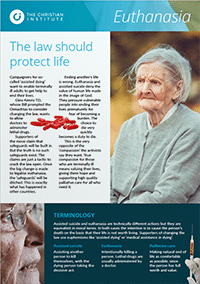A mother has been given a life sentence for killing her 22-year-old brain-damaged son in a case which is sure to spark a debate over euthanasia.
Watch an ITN News report on the case
Frances Inglis, 57, told the jury she acted “with love” when she injected her son with a lethal dose of heroin to end his life.
Mrs Inglis has been found guilty of both murder and attempted murder. She first tried to take her son’s life in September 2007 and was charged with trying to kill him.
She was then released on bail on condition she wouldn’t visit her son again but she defied the order and succeeded in killing him on her second attempt in November 2008.
The judge instructed the jury to put emotion aside as no one had the “unfettered right” to take the law into their own hands or to take someone else’s life.
Judge Brian Barker, the Common Serjeant of London, told her: “We can all understand the emotion and the unhappiness that you were experiencing.
“The fact is that you knew that you intended to do a terrible thing.
“You knew you were breaking society’s conventions, you knew you were breaking the law, and you knew the consequences.”
He said: “However we look at all this, this was a calculated and consistent course of criminal conduct.”
Mrs Inglis, who was studying for a nursing diploma, refused to accept an encouraging prognosis by a doctor and was convinced that her son was in constant pain.
Her oldest son Alex told the court that his mother was “constantly frantic and crying and just in a crazy state. You couldn’t speak to her.”
And only ten days after the accident Mrs Inglis asked her neighbour, Sharon Robinson, to help her find some heroin so that she could kill her injured son.
The neighbour told the BBC: “She said her son was lying in a hospital bed and in her mind he was dead. The hospital was infusing all sorts of poisons and drugs into him.
“She wanted to know if I could get heroin for her to kill him and take her own life.
“She was hysterical to say the least.”
Mrs Inglis said the killing was an “act of mercy” after her son, Thomas, suffered serious head injuries when he fell from a moving ambulance in July 2007.
Judge Barker accepted that Mrs Inglis’ belief that her son would not recover following his accident, was “sincerely held”.
He said: “This is a highly unusual and very sad case. I accept that his life and yours were changed on July 7. What you did was to take upon yourself what you thought your son’s wishes would have been, to relieve him from what you described as a living hell.
“But you cannot take the law into your own hands and you cannot take away life, however compelling you think the reason. You have to take responsibility for what you did”, he concluded.
Judge Barker told Mrs Inglis she must serve a minimum of nine years in jail, less the 423 days she has already spent in custody.
Commenting on the case, George Pitcher of The Daily Telegraph, said assisted suicide campaigners must “bear a good deal of the responsibility for introducing the idea to the public consciousness that so-called ‘mercy killings’, which have no standing in British law, are in some way okay so long as the words ‘compassion’ and ‘loved ones’ can be trotted out.
“The truth is that murder is clearly defined on the statute book. To undermine that in the legislature with the concept of ‘mercy killing’ is to introduce a nightmare world in which some lives are deemed inferior to others”, he said.
He said it would create a world in which “the able-bodied determine the life-span of the disabled and terminally ill, in which doctors and nurses are compromised by the administration of death as a clinical practice and in which ‘loved ones’ potentially can be dispatched by wicked relatives when they become inconvenient and burdensome.
“The law as it stands should protect us from that”, he added.

